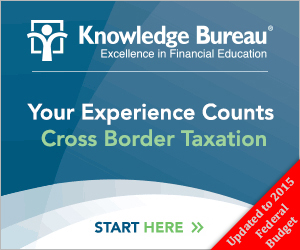
Cross-Border Taxation Updated to Reflect Tax Changes and More - ENROL NOW AND SAVE!
Operating across national borders is easier and more common than ever, driven by technology and economic changes that make it appealing for individuals and businesses to purchase investment property globally.
As a result, cross-border taxation issues become key for any employers, employees or entrepreneurs whose businesses span borders, as well as for anyone who owns assets in another country. These people also increasingly face complex issues around residency rules and U.S. citizenship.
Advisors who work with affluent boomers must be prepared to discuss cross-border taxation with a comprehensive general knowledge, as well as to recognize and advise on how certain actions on both sides of the border affect a client’s tax situation.
The newly updated Cross-Border Taxation course at Knowledge Bureau covers everything from residency to snowbirds to renouncing U.S. citizenship. The course includes all relevant recent tax changes including:
- Lifetime gift & estate tax exemption has increased to $5,430,000 and the tax rate on amounts over the exemptions is 40%
- Lifetime gift exemption not available for non-residents/non-citizens
- Non-residents of the U.S. who meet the substantial presence test in the current year (i.e. file treaty form 8833 to claim closer ties to Canada) are required to abide by foreign reporting rules
- 8891 forms have been repealed and replaced with form 8833 treaty filings & TDF 90-22.1 forms (FBARs) are now called FinCEN 114 forms and must be electronically filed
- Temporary employment earnings of up to $10,000, per employer, in an individual’s non-resident country is not taxable in that country under the Canada-U.S. Tax Convention for federal purposes (state taxation is different)
- Cost to renounce has increased to $2,350
Students will learn the key concepts surrounding residency, non-residency, immigration, emigration, taxation of U.S. citizens and residents, as well as other taxation issues surrounding cross-border transactions from a Canadian and U.S. point of view, ensuring the most tax-efficient and beneficial decisions possible.
Most chapters feature enlightening and instructive case studies that will ensure that the tax practitioner can adequately explain:
- When Canada and the U.S. tax non-residents
- How Canadian and U.S. tax laws differ
- Filing requirements for U.S. citizens living in Canada & Canadians owning U.S. assets
- Benefits and protections of tax treaties
- How U.S. estate and gift tax apply to U.S. persons as well as non-residents
- What it means to become a non-resident of Canada or the U.S.
- How to enter the United States to work or live
- The tax consequences of terminating residence
- What is FATCA and how does it affect us
Chapters end with multiple choice questions and true-to-life scenarios that test the practical application of the key concepts covered in the course. Actual time spent is influenced by factors such as the student’s background and individual learning style.
KBR readers who enrol in the newly updated Cross Border Taxation course between now and September 18 will receive $50 off the course enrollment. Use Promo Code: KBR
 |
This course is part of the Tax Services Specialist and Retirement Income Specialist designations and was written and updated by Angela Preteau, CA, CPA, and Knowledge Bureau faculty member.
Knowledge Journal:
Table of Contents
Chapter 1: Residency
Chapter 2: Immigration and Emigration
Chapter 3: Snowbirds
Chapter 4: Owning Property as a Non-resident
Chapter 5: Canada-U.S. Tax Treaty
Chapter 6: U.S. Citizenship
Chapter 7: Canadian and U.S. Investments (including FATCA)
Chapter 8: U.S. Estate & Gift Tax
Chapter 9: Renouncing U.S. Citizenship
